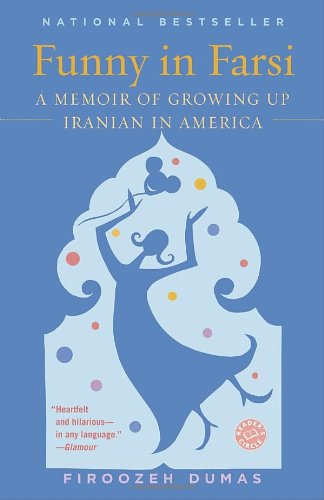This new Readers Circle edition includes a reading group guide and a conversation between Firoozeh Dumas and Khaled Hosseini, author of The Kite Runner.”
In 1972, when she was seven, Firoozeh Dumas and her family moved from Iran to Southern California, arriving with no firsthand knowledge of this country beyond her father’s glowing memories of his graduate school years here. More family soon followed, and the clan has been here ever since.
Funny in Farsi chronicles the American journey of Dumas’s wonderfully engaging family: her engineer father, a sweetly quixotic dreamer who first sought riches on Bowling for Dollars and in Las Vegas, and later lost his job during the Iranian revolution; her elegant mother, who never fully mastered English (nor cared to); her uncle, who combated the effects of American fast food with an army of miraculous American weight-loss gadgets; and Firoozeh herself, who as a girl changed her name to Julie, and who encountered a second wave of culture shock when she met and married a Frenchman, becoming part of a one-couple melting pot.
In a series of deftly drawn scenes, we watch the family grapple with American English (hot dogs and hush puppies?—a complete mystery), American traditions (Thanksgiving turkey?—an even greater mystery, since it tastes like nothing), and American culture (Firoozeh’s parents laugh uproariously at Bob Hope on television, although they don’t get the jokes even when she translates them into Farsi).
Above all, this is an unforgettable story of identity, discovery, and the power of family love. It is a book that will leave us all laughing—without an accent.

A funny and well-written memoir “Funny in Farsi: A Memoir of Growing Up Iranian in America,” by Firoozeh Dumas, begins with 7-year old Firoozeh and her family moving from Abadan, Iran to the strange new land of Whittier, California. From there the story moves back and forth in time, covering the narrator’s childhood in Iran, her adulthood and marriage, and more.
to clarify some misunderstandings I understand the critiques and not-so-positive reviews that this book has received: mostly commenting on how it’s just a bunch of stories put together, there’s not really any “flow”. Or it’s just about superficial, daily, trivial issues. Nothing like a typical “memoir”. I think they’re all valid — as long as these people are willing to admit their preconceived notions of what a “memoir” should be like. (that’s why they’re disappointed, right? and it’s perfectly ok to be disappointed)But, i strongly suggest finding out what the author’s true intentions and goals are before criticizing the work. How? Ask her. (email, letters) Find a reliable source (such as an interview, etc).The main point of the book is on our SHARED HUMANITY. The backdrop of much of her life (especially childhood) was the change from “oh you’re from Iran? (and where the heck is the country?)” to “oh you’re from Iran? (the country whose people are all evil and we hate you guys!)” She is trying to show a lighter picture of Iranians, Middle Easterners; that Iranians are people like us too! (seriously, do you think that all Iranians and Middle Easterns are serious and boring and American-haters? Is this the image that you get from the media?)When you want to learn about a country or people, watching TV is one of the worst ways to learn it. Sure, it gives you a lot of facts, but the portrayal of people tends to focus simply on the negative side, or sometimes the idealistic/romanticized picture. (imagine, for a foreigner who has never been to the States who watches evening news every evening, don’t you think s/he might come to the conclusion that the U.S. is a country full of robbers and theives and rapists and what you have nots? that’s all it is on TV!!!) Now apply this logic to Irians, Middle Easterners, Muslims, and whoever. See if you can come up with any good things about them from the media or any good people. (in fact, the only “good” Middle Easterners portrayed on the media that I can think of on top of my head is Aladdin)If you want to get to know a country or culture, befriend someone who is from there!Firoozeh is trying to tell people that there is this other side of Iranians that most of us don’t know. (if we’re honest, most of us have the attitude of “i don’t care! and i don’t care that i don’t care!”) Iranians are just as human as we all are. Too often we’re so quick to build walls, we don’t even try to build any bridges. We are so quick to point out our differences, we don’t even try to find our commonalities.if you’re looking for a short, light, funny book that will give you an idea of an Iranian family growing up in America, I recommend it! (i admit that’s probably why I like the book!)btw, 1) I’ve read the entire book. 2) I’m not an Iranian. In fact, I’m Chinese. 3)my comments about Firoozeh and her intentions and goals for the book — i didn’t make these up. I met Firoozeh today. She shared with us herself. if you like it, share it with your friends!
if you like it, share it with your friends!
Humorous and Touching The first thing you notice about Funny in Farsi is that it’s impossible to put down. Dumas does an excellent job of weaving absolutely hilarious stories about her family (especially involving her dad, Kazem) with touching tales of family unity in difficult times. It’s not just a typical fish out of water story about the struggle to assimilate into new surroundings, it involves much more than that. Funny in Farsi can engage you in side-splitting laughter and bring a touching tear to your eye all in the same chapter. It’s an unbelievable book that leaves you wanting more when you reach the end much faster than you would have hoped. Buy this book, you’ll love it.